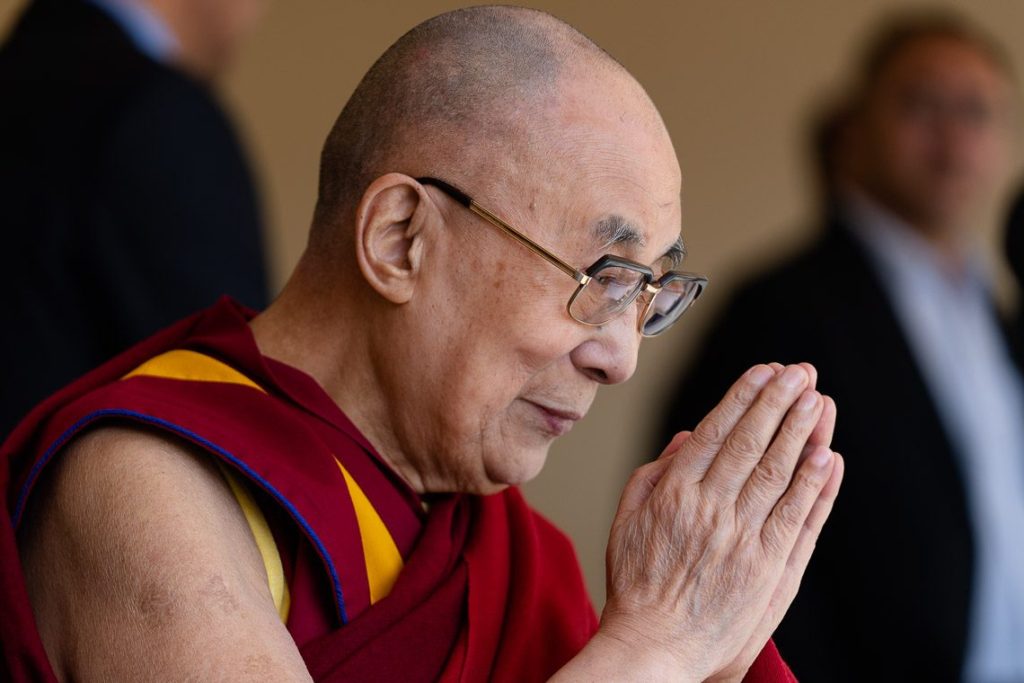
His Holiness the Dalai Lama has proposed that the tradition of reincarnation should now come to an end due to its “connection with the feudal system”. In conversation with a group of students at the Government College, Dharamsala, His Holines the Dalai Lama expressed concerns about the tradition of the Dalai Lama’s reincarnation, which has existed since the fifteenth century.
Addressing a question about maintaining traditional values in modern times, His Holiness said, “Any culture needs to evolve over a period of time. Like, the Buddhist community in India has no tradition of reincarnation or lama institution. It developed in Tibet. I think there is some feudal connection to it and needs to change now,” as quoted in timesofindia.com, October 26 .
Continuing, His Holiness added: “Institutions need to be owned by the people, not by an individual, like my own institution, the Dalai Lama’s office, I feel it is liked to feudal system. In 1969, in one of my official statements I had mentioned that it should continue… But now I feel, not necessarily. It should go, I feel, it should not be concentrated to a few people only.”
“I feel, when the practice of reincarnation began there was wisdom in it. But there are good lamas and bad lamas, those who bring disrepute to the community. The system should end, or at least change with changing times. There have been cases of individual lamas who use reincarnation [to get their way] but never pay attention to study and wisdom,” he noted. This belief reinforces similar comments he made in 2014, where he concluded that it would be “much better that a centuries-old tradition should cease at the time of a quite popular Dalai Lama”.
These comments add further uncertainty to the continuation of the Dalai Lama’s office. His Holiness received criticism in July when he said that he could reincarnate as a woman, but that the woman must be very attractive, “otherwise not much use”, a comment that was widely misinterpreted due to cultural misunderstanding regarding context and the meaning of individual words.
The institution of the Dalai Lama was established when Gedun Gyatso was recognised as the reincarnation of “the omniscient” Gedun Drub in the fifteenth century. The title of Dalai Lama was later given to the third reincarnation, Sonam Gyatso. In 1642 the Gaden Phodrang Government was founded by the Fifth Dalai Lama, Ngawang Lobsang Gyatso, which established him as the spiritual and political head of Tibet.
An uninterrupted series of reincarnations is recognised in the lineage of the Dalai Lama. However, His Holiness the 14th Dalai Lama relinquished his position of political authority from the Central Tibetan Administration in 2011, which was devolved to an elected position currently held by Sikyong Lobsang Sangay. The Dalai Lama wrote that this was done in the pursuit of “the kind of democratic system of government flourishing elsewhere in the world”.
Another aspect of sensitivity surrounding the issue is that the Chinese government relentlessly advocates for its right to decide who the next reincarnation of the Dalai Lama will be. Early this year, China reaffirmed its’ intention to choose a 15th Dalai Lama, insisting that the selection process adhere to its own laws and regulations, sparking worldwide concerns at the prospect.
Whilst the mainstream Tibetan belief is that reincarnation is a religious matter, China has contested that it has sovereign rights over the issue. Zhu Weiqun, chairman of the Ethnic and Religious Affairs committee of the top advisory body to China’s parliament, wrote in the state-run Global Times that the reincarnation issue “has never been purely a religious matter or to do with the Dalai Lama’s individual rights; it is first and foremost an important political matter in Tibet and an important manifestation of the Chinese central government’s sovereignty over Tibet”.
His Holiness the Dalai Lama has warned that any appointment made by China will not be trusted, as is the case with Chokyi Gyalpo, who was controversially installed by China as the 11th Panchen Lama following their abduction in 1995 of Gendun Choekyi Nyima, the six-year-old boy recognised by His Holiness the Dalai Lama as the Panchen Lama.
It is reported that China’s claim to the right to control the reincarnations of Buddhist leaders has been rejected by the United States Congress and that the United States’ policy is that they will follow the Dalai Lama’s guidance on the matter.
Furthermore, the Dalai Lama has stated that his reincarnation must be born outside Tibet and China, otherwise the reincarnation would not have the freedom to continue his work.
Ultimately, the His Holiness the Dalai Lama has long said that he will follow the wishes of his people “[after consultations] with the high Lamas of the Tibetan Buddhist traditions, the Tibetan public, and other concerned people who follow Tibetan Buddhism, and re-evaluate whether the institution of the Dalai Lama should continue or not,” and make a decision around his ninetieth birthday.




 Print
Print Email
Email